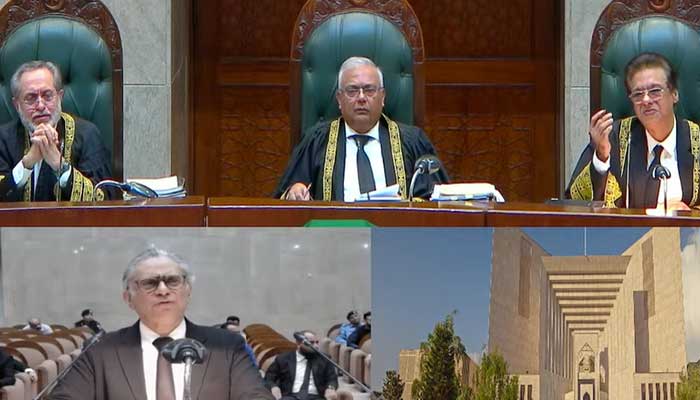Subheading: Justice Jamal Khan Mandokhail asserts the judiciary’s inherent right to hear cases, even if its powers are curtailed, as a constitutional bench deliberates on petitions against the controversial amendment.
ISLAMABAD: During a significant hearing on petitions challenging the 26th Constitutional Amendment, Justice Jamal Khan Mandokhail of the Supreme Court remarked on Wednesday that the apex court and high courts cannot be barred from adjudicating cases, even if their powers are formally restricted.
“If the powers of the entire Supreme Court are taken away by an amendment, who will hear the case? […] the same court would hear the case, right?” Justice Mandokhail observed.
His comments came during proceedings before an eight-member constitutional bench, led by Justice Amin-ud-Din Khan, which is hearing a challenge to the amendment. The bench includes Justices Ayesha A. Malik, Syed Hassan Azhar Rizvi, Musarrat Hilali, Naeem Akhtar Afghan, and Shahid Bilal Hassan.
The petitions have been filed by approximately three dozen entities, including major political parties like the Pakistan Tehreek-e-Insaf (PTI) and Jamaat-e-Islami (JI), bar associations such as those from Lahore and Karachi, and former presidents of the Supreme Court Bar Association.
During today’s session, arguments were presented by Khawaja Ahmed, the counsel for former chief justice Jawwad S. Khawaja. He contended that the 26th Amendment does not explicitly prohibit the formation of a full court to hear the matter.
Justice Amin-ud-Din noted that many senior lawyers have argued for the amendment to be set aside entirely. In response, Khawaja Ahmed pointed out that lawyers, like judges, often hold differing opinions, and stated that he disagrees with the notion that a full court must include all 24 Supreme Court judges.
Justice Ayesha A. Malik posed two central questions: “whether there should be a full court and if yes, then which one?”
Emphasizing that the constitutional bench is not barred from directing the formation of a full court, the lawyer cited Justice Mazhar’s separate definition of a full court in the Raja Amir case. Justice Mandokhail, however, noted that the bench must first determine whether it possesses the authority to issue such an order.
Expanding his argument, Khawaja Ahmed posed a hypothetical scenario involving a “27th Amendment” that would grant an executive officer the power to decide all Supreme Court matters, questioning whether the court would still hear a challenge to it. “You will definitely hear the case even in such a situation,” he asserted.
Justice Mazhar responded, “None of us has denied that we will not hear the 26th Amendment on its merits,” adding that the bench would rule on the amendment’s validity if the lawyer could successfully prove it violates the Constitution’s basic structure.
The counsel further argued that for the case to be heard properly, the court must examine whether the correct procedure was followed in enacting the constitutional amendment. He maintained that the Supreme Court remains the ultimate authority for hearing such challenges.
When Justice Mazhar asked whom the bench should direct to form a full court, Khawaja Ahmed replied, “Sir, do not underestimate your powers; you can issue a judicial order or direct an executive authority you want, they will be bound by your order.”
Following the conclusion of Khawaja Ahmed’s arguments, the hearing was adjourned until Thursday, with lawyer Shahid Jamil, representing Mustafa Nawaz Khokhar, scheduled to present his case.














